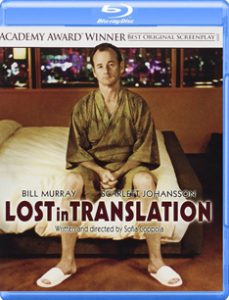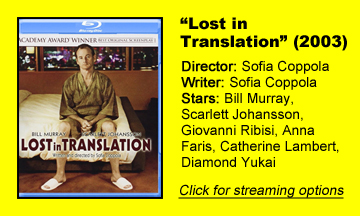From the early shot of Bill Murray’s Bob Harris riding through Tokyo in a cab while Girls’ “Death in Vegas” plays, “Lost in Translation” (2003) is an exquisite sounds-and-pictures poem about loneliness. Cinematographer Lance Acord’s lens captures the sadness of a big city – especially when you’re already cut off from it via language and culture – and this melds with Kevin Shields’ score and perfect fuzzy-guitar soundtrack choices – including some from Shields himself.
Throw in perhaps the best performances of the careers of Murray and Scarlett Johansson, and this is a timeless gem (fax machines notwithstanding) that established Sofia Coppola as an elite writer-director.
The slowest burn
“Translation” is a neat trick in the rom-com genre (if we expand the definition to include everything with romance and comedy, and not just cheesy flicks): For the first two acts, we don’t think of the relationship between Hollywood legend Bob and young photographer’s wife Charlotte as a romance.
The film communicates the surreal nature of these Americans’ time in Tokyo (which is actually just one week, so it almost makes me want to say “Suck it up! You can handle one week!”).
Crossing paths a few times in the hotel, they bond over their common plights – one of which is the inability to fall asleep due to the time difference.
Magnificent Murray
This feeling of detachment from the daily grind – even as people hustle and bustle all around them – is enhanced by absurdities that make Murray an ideal casting choice and which also allows him space to craft a fine dramatic performance.
The over-directed whisky commercial – “For a relaxing time, make it Suntory time” – is hilarious, but then we also get the dialog-free physical humor of Bob attempting to ride an exercise bike with Japanese instructions.
Later, Bob’s appearance on “the Japanese Johnny Carson’s” painfully stupid TV show is pure awkwardness, rather than being funny or sad, but it’s another instance where we’re in the trenches with Bob.
Murray nails the sad moments. His karaoke rendition of “More Than This” as Charlotte looks on is beautiful, even though the actor has done a lot of goofy-singing shtick in his career.
Subdued Scarlett
Meanwhile, Charlotte’s ennui is relatively subdued – although our heart breaks for her when she calls a Stateside friend who is unable to grasp Charlotte’s fear that she shouldn’t have married John (Giovanni Ribisi).
Her absurdities come less from her own awkwardness – to a point, she fits the bill of an elegant, cigarette-smoking depressed person, like from a French film – although there are ridiculous things in her circle, notably John’s bubbly actress friend Kelly (Anna Faris).
In Bob, the observant Charlotte sees someone who will understand her. Johansson is wonderfully subtle in “Lost in Translation,” in which she finds the transition point in her career from gawky teen (“Ghost World”) to super-woman (Black Widow in the MCU). She grows into her looks and grows into her skills before our eyes.

When Charlotte and Bob fall asleep next to each other while talking about life, he’s a mentor figure sharing hard-earned insights about marriage and children.
It’s Charlotte who reacts to Bob’s tryst with the red-haired lounge singer (Catherine Lambert) as if he’s cheating on her, and the film concludes as a romance, earning something that should’ve been near-impossible to earn.
A fully surrealized world
This romance between a guy in his 50s a girl in her 20s (Johansson was 19, but Charlotte is a college graduate, and her maturing looks sell it) is not widely (if at all) ripped for being immoral or disgusting. The fact that the writer-director is a woman – and one who resembles Johansson – probably helps.
But mainly, “Translation” creates a fully realized (or surrealized?) world in which this relationship is the most natural thing. (And it contrasts with similar age-gap relationships in 2001’s “Ghost World” and 1999’s “American Beauty” that take the opposite position. Upon its release, “Translation” was daringly different.)
The film ends with Bob whispering something unintelligible (to the audience) in Charlotte’s ear, which is the perfect ending – although it might be frustrating on first viewing.
They could be agreeing to continue their relationship in the States, or they could agree that this was a magical, if short, period in Tokyo that can’t be repeated, but which they will always cherish. I side with the latter interpretation, because it reflects how I feel about “Lost in Translation.”


